Featured
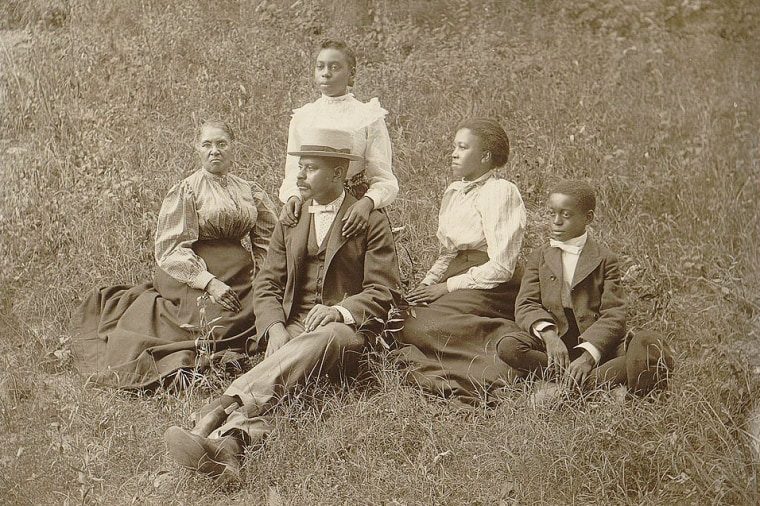 How Black families, torn apart during slavery, worked to find one another again. By Claretta Bellamy / NBC News
How Black families, torn apart during slavery, worked to find one another again. By Claretta Bellamy / NBC News
An African American family sits for a portrait in the late 19th century.
Throughout slavery, Black family units were in constant danger of disruption, and those in bondage had no control over the structure of their families, let alone their lives. But the Reconstruction era, which followed the Civil War and the end of enslavement, was a pivotal turning point in history for African Americans and their families.
During Reconstruction, from 1865 to 1877, 4 million previously enslaved Black people worked to establish themselves in their new independence. Three new constitutional amendments, Crew said, “changed the nature of citizenship in this country.” The end of slavery also gave the opportunity for African Americans to reconnect with family members displaced over generations. Families would travel to nearby plantations and farms, while also placing advertisements in newspapers in hopes of being reunited with their long-lost loved ones. Read more
Political / Social
 Republicans have dropped the mask — they openly support fascism. What do we do about it? Chauncey Devega / Salon
Republicans have dropped the mask — they openly support fascism. What do we do about it? Chauncey Devega / Salon
Are we so numb we can’t see what just happened? Republicans don’t even pretend to believe in democracy anymore.
Last week the Republican National Committee dropped any remaining pretexts of patriotism or love of democracy with its now-infamous statement that those who attacked the U.S. Capitol on Jan. 6, 2021, were “ordinary citizens engaged in legitimate political discourse.” Reports suggest that a draft version of that RNC statement was even bolder in its embrace of right-wing terrorism. Last Friday’s statement of support for fascism announced that the Republican Party has birthed a monster that will ultimately eat it alive. But looking beyond outrage and disgust, what does this tell us about America in this moment of existential crisis? Read more
Related: The Constitution Was Meant to Guard Against Oligarchy. By Chris Lehmann / The New Republic
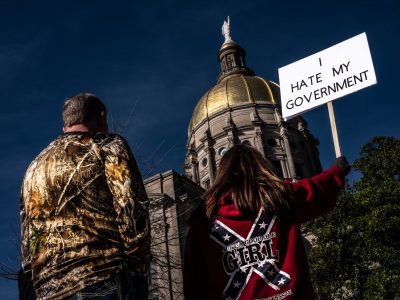 Why We Are Not Facing the Prospect of a Second Civil War. By Jamelle Bouie / NYT
Why We Are Not Facing the Prospect of a Second Civil War. By Jamelle Bouie / NYT
If you’re worried about a second Civil War, the question to ask isn’t whether people hate each other — they always have, and we tend to grossly exaggerate the extent of this country’s political and cultural unity over time — but whether that hate results from the irreconcilable social and economic interests of opposing groups within the society. If it must be one way or the other, then you might have a conflict on your hands. That’s where America was with slavery. That’s why our actual Civil War has been called the impending crisis. I’m not sure there’s anything in American society right now that plays the same role that the conflict over slavery did. Read more
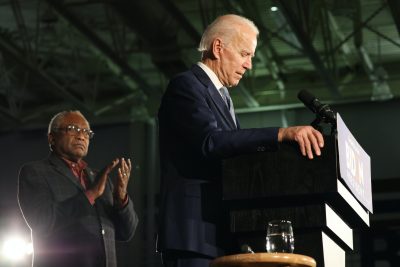 New Swing-State Ads Try to Tell Black Voters: Yes, Biden’s Looking Out for You. By Daniel Strauss / New Republic
New Swing-State Ads Try to Tell Black Voters: Yes, Biden’s Looking Out for You. By Daniel Strauss / New Republic
Ahead of an election cycle where Democrats are in danger of suffering across the board losses due to depressed turnout among key constituencies, a nonprofit group targeting African American voters is releasing a set of digital and radio ads aimed at touting President Biden’s accomplishments and increasing Black turnout.* The organization, Building Back Together, is releasing the ads in three key states: Pennsylvania, Wisconsin, and Georgia. The ads are targeting Black communities in those states and were shared first with The New Republic. Read more
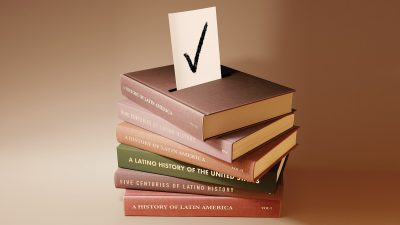 There’s No Such Thing as ‘the Latino Vote.’ By Geraldo L. Cadava / The Atlantic
There’s No Such Thing as ‘the Latino Vote.’ By Geraldo L. Cadava / The Atlantic
Latinos and their ancestors have lived in the Americas for 500 years, yet it feels like many Americans are perpetually in the act of discovering us—especially when elections are looming. We are instrumental to the emerging Democratic majority that Blue America longs for, that Red America fears, and that never quite seems to arrive. he conventional wisdom that Latinos are reliable members of a liberal coalition of people of color has never been exactly right: Between a quarter and a third of Latinos have voted Republican in almost every presidential election for the past half century Read more
Related: Why Latinos are turning to the Republican Party. By Justin Gest / CNN
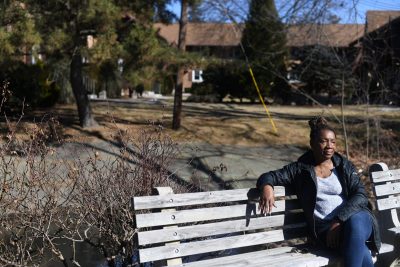 Why Black home ownership gap is growing — and will continue to do so. By Swapna Venugopal Ramaswamy / USA Today
Why Black home ownership gap is growing — and will continue to do so. By Swapna Venugopal Ramaswamy / USA Today
Sonia McGee, age 60 has been searching for a home in the last year. She has never lived in a house that she or her family has owned.
The gap in the homeownership rate between Black and white families in the U.S. is bigger today than when it was legal to discriminate based on race, according to a study by the Urban Institute. Since 2001, the Black homeownership rate has seen the most dramatic drop of any racial or ethnic group in the U.S., falling 5% compared with a 1% decline for white families and increases for Hispanic and Asian Americans. Read more
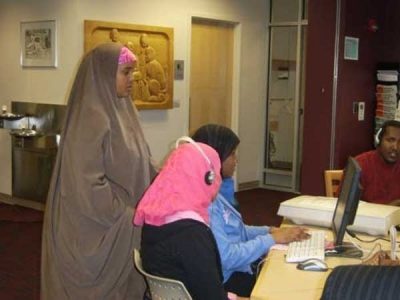 As Minnesota’s Black population grows, African Americans and African immigrants unite. By Fred de Sam Lazaro and Sam Lane / PBS
As Minnesota’s Black population grows, African Americans and African immigrants unite. By Fred de Sam Lazaro and Sam Lane / PBS
Three high profile police killings of Black men in the past two years have led to ongoing conversations about racial justice in Minnesota. There’s also been noticeable solidarity between the state’s African American and African immigrant populations. Minnesota remains predominantly white, but its non-white population has grown over the past three decades. It’s about 24 percent today. Blacks have been a large part of that growth, including substantial immigration and refugee resettlement from across the African continent. And they have become far more engaged in politics and civic activism. Read more
 Prosecutor outlines Ahmaud Arbery’s murderers use of racial slurs. By Joe Hernandez / NPR
Prosecutor outlines Ahmaud Arbery’s murderers use of racial slurs. By Joe Hernandez / NPR
Bernstein said there will be testimony that Greg McMichael, a former police officer and district attorney’s office investigator, had ranted about Black people being “nothing but trouble” and posted memes on social media that supported vigilantism — suggesting that it’s better to have a loaded gun than to call the police. Additionally, Bernstein said the third defendant, William “Roddie” Bryan, had also used the N-word and other slurs, in one instance, after learning that his daughter was dating a Black man. She said Bryan commented that his daughter “has her n——-r now,” according to AP. Read more
 If the Kids Had Been White, Would Any of This Have Happened? By Karim Doumar / ProPublica
If the Kids Had Been White, Would Any of This Have Happened? By Karim Doumar / ProPublica
After Black children were arrested for a crime that didn’t exist, we wanted to understand the scope of the problem. Here’s how we used data, documents and other forms of reporting to investigate. The results: From 2010-2019, between 14% and 16% of children in Rutherford county were Black. Far below the 38% of jailed children. That’s a huge racial disparity. But there was more context to add still. In fact, The Sentencing Project showed that in 2019, 41% of the children incarcerated nationally were Black, even though Black children make up only 15% of the nation’s youth. Read more
Ethics / Morality / Religion
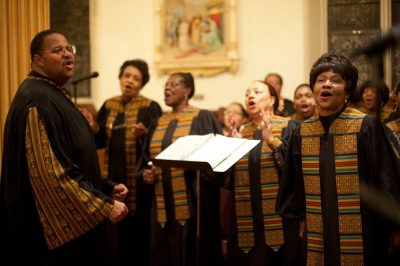 Shades of Black: Ethnic Diversity in Black American Religious Life. By Kijan Bloomfield / AAIHS
Shades of Black: Ethnic Diversity in Black American Religious Life. By Kijan Bloomfield / AAIHS
Martin Luther King, Jr. remarked, “Sundays at noon is the most segregated hour in the U.S.” The Pew Research Center’s report “Faith Among Black Americans” is a window to the religious life of America’s darker hues. Historically, the report is not the first national mixed-method survey on the subject. In 1903, Black sociologist W.E.B. Dubois (along with Mary Church Terrell and Kelly Miller) published a report titled “The Negro Church” a sociological study on the “…religion of Negroes and its influence on their moral habits.”1 Read more
Related: On Black Religion and Domestic Globalization. By Sherman A. Jackson / AAIHS
 How Biden’s faith-based office has advanced his vow to heal the soul of the nation. By Chris Coons / RNS
How Biden’s faith-based office has advanced his vow to heal the soul of the nation. By Chris Coons / RNS
The president’s belief in the power of faith led him to support the Office of Faith-Based and Neighborhood Partnerships.
“Preach the gospel at all times. When necessary, use words.” Those words of St. Francis to his followers come to mind this week as we mark the one-year anniversary Monday (Feb. 14) of President Joe Biden’s reestablishment of the White House Office of Faith-Based and Neighborhood Partnerships, a little over a year since he put his hand on the Bible and took the oath of office as our 46th president. Looking back over that year, it’s evident that President Biden believes deeply in the words of St. Francis. Read more
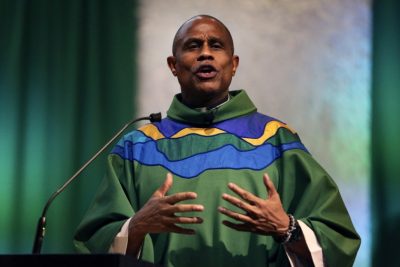 Black gay priest in NYC challenges Catholicism from within. By AP and NBC News
Black gay priest in NYC challenges Catholicism from within. By AP and NBC News
The Rev. Bryan Massingale considered leaving the Catholic Church but decided to stay and make it “more universal and the institution that I believe Jesus wants it to be.”
Parishioners worshipping at St. Charles Borromeo Catholic Church in Harlem are greeted by a framed portrait of Martin Luther King Jr. — a Baptist minister named after a rebellious 16th century German priest excommunicated from the Catholic Church. The Rev. Bryan Massingale, who sometimes preaches at St. Charles, pursues his ministry in ways that echo both Martin Luthers. Like King, Massingale decries the scourge of racial inequality in the United States. As a professor at Fordham University, he teaches African American religious approaches to ethics. Read more
 Latino vote not monolithic, though Catholic Latinos lean Democratic, say panelists. By Melissa Cedillo / NCR
Latino vote not monolithic, though Catholic Latinos lean Democratic, say panelists. By Melissa Cedillo / NCR
Ana Gonzalez-Barrera of the Pew Research Center noted that Catholic Latinos are more likely to vote Democratic, as are religiously unaffiliated Latinos, but Protestant, especially evangelical, Latinos are more likely to vote Republican. “Latino Catholics consider their conscience to vote, a conscience guided by their Catholic belief and values,” said Maria de Lourdes Valencia, associate director of the Culture of Life office in the San Diego Diocese. Read more
Historical / Cultural
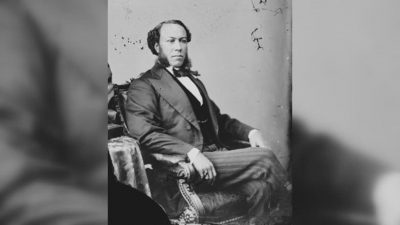 First Black Congressman honored at U.S. Capitol. By Jaz Garner / CBS News
First Black Congressman honored at U.S. Capitol. By Jaz Garner / CBS News
Joseph H. Rainey, who was born into slavery in 1832 and went on to become the nation’s first Black congressman, was honored at the U.S. Capitol last week. When the Civil War broke out, Confederates swept through the city enlisting every able-bodied man, free or not. Joseph Rainey was put to work on fortifications around Charleston Harbor. Taking a well-planned route, he escaped to Bermuda where slavery had been abolished 20 years before, and shortly after, he was joined by his wife Susan. They remained in Bermuda until the end of the Civil War. Rainey returned to the U.S with a determination to help the newly freed Black slaves and others avail themselves of the new opportunities that had been promised. He felt the best way to do that was by entering politics; to work within the system to achieve profound and lasting changes. Read more
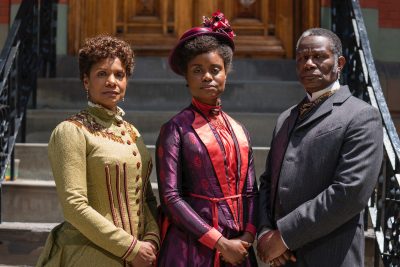 The Gilded Age’ Explores a Rarely Seen Chapter of Black History. By Dave Itzkoff / NYT
The Gilded Age’ Explores a Rarely Seen Chapter of Black History. By Dave Itzkoff / NYT
The HBO period drama wanted to depict an elite class of 19th-century Black New Yorkers with historical accuracy. Its cast and creative team worked to portray them with dignity.
The existence of an elite Black population in this era of the city — Black men and women who had careers, money and influence — is a factual reality, though one that is not often explored in popular culture. As the show’s historical consultant, Erica Armstrong Dunbar, said: “What does the average person know about the Black elite in New York in the 1880s? The answer is very little if anything.” To look at how film and television have generally treated this era of Black history, she added, “There’s this huge gap between the Civil War and slavery and then, maybe, the Harlem Renaissance — as if nothing happened in between.” Read more
 Inside effort to restore resort town that was once paradise for Black Americans. NBC News
Inside effort to restore resort town that was once paradise for Black Americans. NBC News
Idlewild, a summer resort town built in Michigan in the 1920s, was once a reprieve from segregation and the horrors that came with being Black in America. Things changed after the Civil Rights Act of 1964 was signed and Black families had more places to go. Now there’s a renewed effort to bring Idlewild back. Watch here
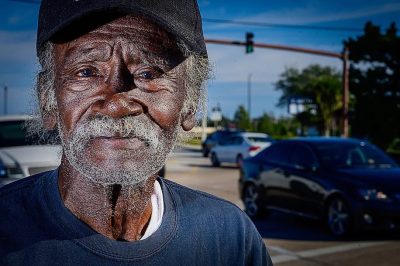 Beaten by the Klan in 1963, a Black man just spoke to the White pastor who helped rescue him. By Martin Dobrow / Wash Post
Beaten by the Klan in 1963, a Black man just spoke to the White pastor who helped rescue him. By Martin Dobrow / Wash Post
It was a warm and windswept Wednesday, Sept. 18, 1963, following a day of torrential rains — more than 9 inches — in St. Augustine, Fla. Shortly after noon, Jackson was making his way past the city’s Plaza de la Constitución, which featured a towering Confederate memorial as well as the regular checkers venue, an open-air pavilion where Black people were once sold as commodities. Pretty much everyone still called it the Slave Market. Jackson was getting tired of keeping quiet. He had recently joined the NAACP Youth Council, which in sleepy, touristy St. Augustine had awakened that summer under the leadership of Robert Hayling, a Black dentist. Read more
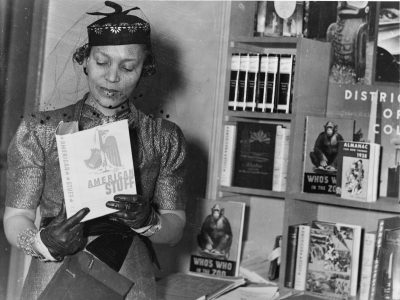 The Zora Neale Hurston We Don’t Talk About
The Zora Neale Hurston We Don’t Talk About
In the new nonfiction collection “You Don’t Know Us Negroes,” what emerges is a writer who mastered a Black idiom but seldom championed race pride.
That Hurston was no friend of the left is no secret, though few are as eager to discuss her politics as John McWhorter, the writer and linguist, who’s dubbed Hurston “America’s favorite black conservative.” Black conservatism, like folklore, is a tradition with long roots, even if white people seldom recognize it as such. In the introduction to the new collection, Gates and West write that “we might think of Hurston as a Black cultural nationalist, in contemporary Black political parlance, or as a Black cultural ‘conservative’ or a ‘traditionalist.’ Read more
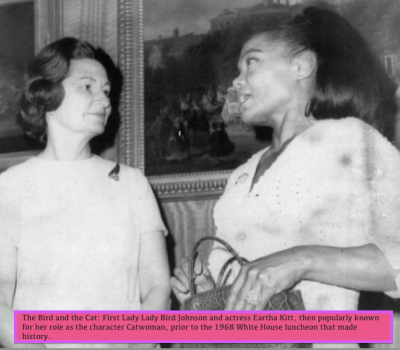 When Eartha Kitt Disrupted the Ladies Who Lunch.
When Eartha Kitt Disrupted the Ladies Who Lunch.
Scott Calonico’s documentary short “Catwoman vs. the White House” reconstructs an unexpected moment of activism during the Vietnam War.
Eartha Kitt didn’t want to attend the White House luncheon that wound up derailing her career: the 1968 Women Doers Luncheon, the First Lady Claudia (Lady Bird) Johnson called it. The topic of interest would be delinquency in the streets. Kitt didn’t put much stock in the gathering. “Those luncheons—what are they gonna mean?” she remembered thinking. “Blah-blah-blah-blah-blah, and that’s it.” Read more
 50 Years After Recording “No Knock,” Gil Scott-Heron’s Protest Song Contains a Prescription. By Daniel King / Mother Jones
50 Years After Recording “No Knock,” Gil Scott-Heron’s Protest Song Contains a Prescription. By Daniel King / Mother Jones
No-knock raids are in the news again after last week’s police killing of Amir Locke, but the tactic and its impact have never left the minds of artists and activists calling for its end. As you follow along with our colleague Eamon Whalen’s reporting on the Locke case, take a listen to Gil Scott-Heron’s “No Knock,” recorded 50 years ago. Listen here
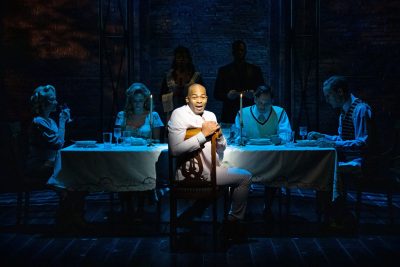 Review: In ‘Black No More,’ Race Is Skin Deep, but Racism Isn’t. By Jesse Green / NYT
Review: In ‘Black No More,’ Race Is Skin Deep, but Racism Isn’t. By Jesse Green / NYT
A new musical imagines the invention of a decolorizing process. Will it save Black Americans from hatred or destroy them?
The 1931 Afrofuturist novel from which the new musical “Black No More” takes its name is hardly subtle, starting with its subtitle: “Being an Account of the Strange and Wonderful Workings of Science in the Land of the Free, A.D. 1933-1940.” George S. Schuyler’s satire is basically a thought experiment in which a procedure that decolorizes Black people solves America’s race problem but creates a new one when there’s no one left for haters to hate. Read more
 Snoop Dogg is converting Death Row Records into the first NFT music label. By Chris Morris / Fortune
Snoop Dogg is converting Death Row Records into the first NFT music label. By Chris Morris / Fortune
The rapper/entertainer/crypto enthusiast has announced plans to make Death Row the first NFT music label. Snoop bought the label, which was founded by Dr. Dre and Suge Knight, among others, and which launched his career, last week. The announcement took place on social media channel Clubhouse. “Death Row will be an NFT label,” said Snoop. “We will be putting out artists through the metaverse…Just like we broke the industry when we was the first independent to be major, we want to be the first major in the metaverse.” Read more
 How The Natural Hair Movement Has Failed Black Women. Esther Akutekha / HuffPost
How The Natural Hair Movement Has Failed Black Women. Esther Akutekha / HuffPost
When the natural hair movement swept America a decade ago, it was supposed to encourage Black women to love their hair in its natural state with the help of products and regimens specific to and best for Black hair. But by glamorizing looser curls and prioritizing techniques and products to create “defined curls,” the movement focuses less on loving textured hair and more on manipulating those kinks into curls. Read more
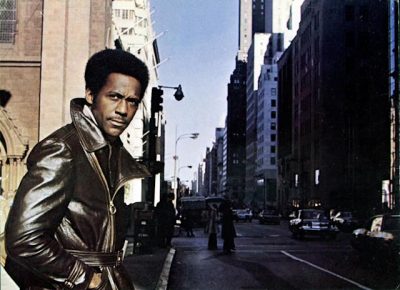 Blaxploitation classics like ‘Shaft’ radiate Black Power 50 years on. By Marco della Cava and Rasha Ali / USA Today
Blaxploitation classics like ‘Shaft’ radiate Black Power 50 years on. By Marco della Cava and Rasha Ali / USA Today
“Shaft” was made for $500,000 and grossed $13 million, nabbing a best original song Oscar for title track composer Isaac Hayes. Soon, the floodgates would open, releasing a deluge of so-dubbed Blaxploitation movies throughout the 1970s. The legacy of this controversy-stirring oeuvre is undeniable, cultural experts say. Blaxploitation films, born when Black consciousness was ascendant, stirred the imaginations of kids who in the ’80s created indelible hip-hop tales, in turn inspiring filmmakers Spike Lee, John Singleton and even Quentin Tarantino. Read more
Sports
 NFL owners need a jolt to make fairer decisions in hiring Black coaches and executives. By William C Rhoden / The Undefeated
NFL owners need a jolt to make fairer decisions in hiring Black coaches and executives. By William C Rhoden / The Undefeated
On Sunday, in glitzy SoFi Stadium, the NFL completed its 102nd season, a season that saw record television ratings and record profits. The league tightened its grip on our collective psyche with great competition, violence, compelling games and emerging stars. But the season also ends with ongoing unresolved conflicts about the league’s continued resistance to hiring and retaining African Americans as head coaches and executives. There must be a hammer to be dropped — or threatened to be dropped — on NFL owners that will move them to make fairer decisions in the hiring process. The Flores lawsuit got the owners’ attention. Getting the U.S. government to threaten to take away the NFL’s antitrust exemption would get the owners’ attention; NFL players threatening to take some collective action would get their attention. Read more
 Aaron Donald, the Super Bowl’s true MVP, finally gets his ring. By Sally Jenkins / Wash Post
Aaron Donald, the Super Bowl’s true MVP, finally gets his ring. By Sally Jenkins / Wash Post
Aaron Donald grabbed Joe Burrow by the waist and swung him around three times as if he was the lead and Burrow was the follow in a waltz pairing. Around and around Burrow went, in that violent spin before he hit the ground, the last dance in an intimate un-love story. The strange pairing of ferocity and joy, like everything else Donald did with so much intensity in the Super Bowl, cut through all the overhyped gigantism of the occasion with memorable physical detail. Cooper Kupp was named the MVP in the Rams’ 23-20 victory over the Cincinnati Bengals because Kupp had the more spectacular role. But it was Donald, the defensive lineman, who really turned the game, in the same visceral, powerful way that a hydraulic dam stops a river. That play with Burrow wasn’t the last play of the game, but it was certainly the play that ended it. “One last play to be world champs,” as Donald said. Read more
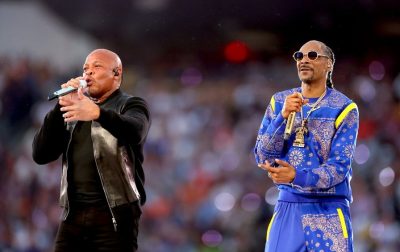 Was the Super Bowl Halftime Show a “Missed Opportunity”? By Dave Zirin / The Nation
Was the Super Bowl Halftime Show a “Missed Opportunity”? By Dave Zirin / The Nation
As the philosopher Cornel West noted, a missed opportunity. West wrote on Facebook, “The #SuperBowl halftime performance displayed our great Black musical tradition! But it was also a missed opportunity for truth-telling about Brian Flores’ challenge to the NFL’s plantation system.… the political silence of our artists was sad!” This is the NFL, a league that colluded against and expelled Colin Kaepernick for taking a knee against racist police violence and is now embroiled in a racial discrimination lawsuit brought by recently fired Miami Dolphins head coach Flores. It is a league with zero Black ownership and a scant number of Black executives. It is a league that projects Black excellence under the thumb of white authority. Read more
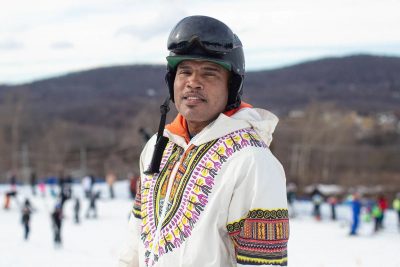 Snowboarding was his passion. Making the sport more inclusive became his mission. By Dustin Jones / NPR
Snowboarding was his passion. Making the sport more inclusive became his mission. By Dustin Jones / NPR
Now 47, Paupaw often sees his younger self in the kids he’s trying to help these days. He and his business partner, Omar Diaz, 52, spend their weekends shuttling kids from Brooklyn to upstate New York and northwest New Jersey for a day in the mountains. Together, the two men have provided kids from low-income communities with the opportunity to get into snowboarding, keeping them on the slopes and off the streets through their Hoods to Woods Foundation. Read more
 Utah Jazz Scholarship program makes every win a little more significant. By Marc J. Spears / The Undefeated
Utah Jazz Scholarship program makes every win a little more significant. By Marc J. Spears / The Undefeated
With each victory, the Jazz provide a Utah high school student from an underrepresented group with a full college scholarship
Before the 2020-21 season, Jazz owners Ryan and Ashley Smith pledged to give a full college scholarship to a Utah high school student from an underrepresented group to a public university in the state for every win in the preseason, regular season and postseason. The winners of the college scholarships have primarily been teenagers of color who need financial assistance in the predominantly white state. Read more
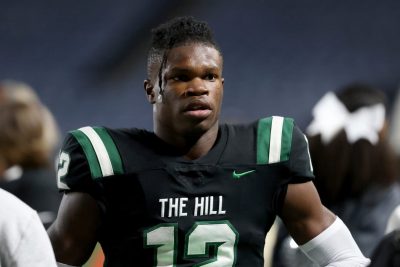 Travis Hunter commits to JSU: Are more Black athletes choosing HBCUs? By Cydney Henderson / USA Today
Travis Hunter commits to JSU: Are more Black athletes choosing HBCUs? By Cydney Henderson / USA Today
In December, five-star cornerback Travis Hunter decommitted from Florida State and committed to join Sanders’ Jackson State. As the nation’s No. 1 overall football prospect, he marks the highest-rated commitment in Jackson State and historically Black college or university history. HBCUs are often overlooked by top recruits in basketball, football and other sports for the resources and exposure offered by predominantly white institutions. But the resurgence of the Black Lives Matter movement and push toward supporting Black-owned businesses have motivated some Black athletes to use their talents to strengthen Black communities. “Historically Black Colleges have a rich history in football,” Hunter tweeted on Dec. 15. “I want to be part of that history, and more, I want to be part of that future.” Read more
Site Information
Visit our home page for more articles, book/podcast and video favorites. And at the top of this page register your email to receive notification of new editions of Race Inquiry Digest. Click here for earlier Digests.
About Race Inquiry and Race Inquiry Digest. The Digest is published on Mondays and Thursdays.
Use the buttons below to share the Digest in an email, or post to your Facebook, Linkedin or Twitter accounts.
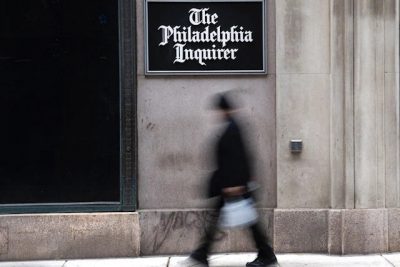 The Philadelphia Inquirer set out to become an ‘anti-racist’ newspaper. That meant taking a tough look at its history. By Margaret Sullivan / Wash Post
The Philadelphia Inquirer set out to become an ‘anti-racist’ newspaper. That meant taking a tough look at its history. By Margaret Sullivan / Wash Post